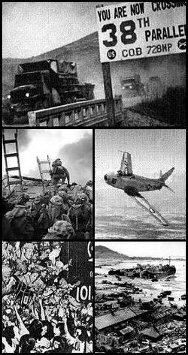Interpretations of the Korean War (micro article)
_This is an ultra-short article that attempts to cover two differing interpretations of the Korean War in less than 250 words._
 The Korean War is an unresolved conflict, ostensibly between the states of North and South Korea, that began in June 1950 and that has remained suspended since an armistice in July 1953. The conflict rapidly developed from an invasion attempt by the North into an international conflict by proxy, principally between the USA-dominated UN and the PRC, each attempting to secure and promote their own ideologies via the war.
The Korean War is an unresolved conflict, ostensibly between the states of North and South Korea, that began in June 1950 and that has remained suspended since an armistice in July 1953. The conflict rapidly developed from an invasion attempt by the North into an international conflict by proxy, principally between the USA-dominated UN and the PRC, each attempting to secure and promote their own ideologies via the war.
Whilst Rees’ Korea: The Limited War and Gills’ Korea versus Korea both describe the combination of domestic and international factors that determined the course of the conflict, the accounts differ in the weighting they give to each set. Rees focusses on a more international conflict, attributing the conclusion of an armistice above all to “the threat by the US to carry atomic war to mainland China unless a truce were signed.” Secondary to this, in Rees’ view, was the blow dealt to communism as a whole (both international and domestic participants) by the death of Stalin in March 1953.
Gills, however, describes how the international forces involved “underestimated the profundity of [Korean] nationalism that was the determining aspect…” and points out that the UN could only lend legitimacy to an armistice: a true solution can only be achieved by “the Koreans themselves.”
